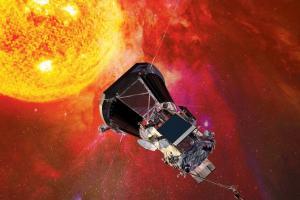After the Parker Solar Probe blasts off from Cape Canaveral, Florida on August 11, it will become the first spacecraft ever to fly through the Sun's scorching atmosphere, known as the corona

The probe will endure temperatures of about 1,370 C. Pic/AFP
NASA is poised to launch a $1.5 billion spacecraft on a brutally hot journey toward the Sun, offering scientists the closest-ever view of our strange and mysterious star.
ADVERTISEMENT
After the Parker Solar Probe blasts off from Cape Canaveral, Florida on August 11, it will become the first spacecraft ever to fly through the Sun's scorching atmosphere, known as the corona.
Understanding how the corona works will help scientists anticipate dangerous space weather storms, which can disrupt the power grid on Earth. "It's of fundamental importance for us to be able to predict space weather much the way we predict weather on Earth," explained Alex Young, a solar scientist at NASA. The corona is a "very strange, unfamiliar environment for us."
The probe is named after Eugene Parker, the 91-year-old pioneering solar astrophysicist, and the US space agency has coined it as the first mission to "touch the Sun." It will actually skim by at a distance of 6.16 million kilometers above the Sun's surface.
Catch up on all the latest Crime, National, International and Hatke news here. Also download the new mid-day Android and iOS apps to get latest updates
This story has been sourced from a third party syndicated feed, agencies. Mid-day accepts no responsibility or liability for its dependability, trustworthiness, reliability and data of the text. Mid-day management/mid-day.com reserves the sole right to alter, delete or remove (without notice) the content in its absolute discretion for any reason whatsoever
 Subscribe today by clicking the link and stay updated with the latest news!" Click here!
Subscribe today by clicking the link and stay updated with the latest news!" Click here!






